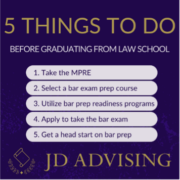How is the California Bar Exam Scored?
How is the California Bar Exam Scored?
Effective as of July 2017, the California bar exam is composed of three parts: the Multistate Bar Exam (MBE), which consists of 200 multiple choice questions; one 90-minute performance test; and five, hour-long essays. On the first day, exam takers complete five one-hour essays and one 90-minute performance test. On the second day, examinees take the MBE.
The California bar exam has 2000 possible points.
On July 16, 2020, the California Supreme Court announced that it was permanently reducing the passing score from 1440 to 1390. On August 10, 2020, the California Supreme Court issued an order stating that the 1390 passing score would not be applied retroactively to past exam takers. Thus, effective as of October 2020, you need 1390 points to pass the California Bar Exam.
UPDATE: California passed an order on January 28, 2021 that allows examinees who narrowly passed the California Bar Exam between February 2020 and July 2015 to be admitted to the state bar after completing 300 hours of supervised law work (no second bar exam is required).
The California bar exam has 2000 possible points. You need 1440 points to pass the California bar exam.
How, exactly, is the California Bar Exam scored?
Each portion of the California bar exam is scored as follows:
- 200 multiple choice questions (MBE) worth 50% of your overall score (maximum number of points you can receive is 700)
- One ninety minute performance test (MPT) worth 200 points each or approximately 14.3% of your overall score (maximum number of points you can receive is 200)
- Five one-hour essays worth approximately 35.7% of your overall score (maximum number of points you can receive is 500)
You will note that the most important part of the California bar exam is the written part. Your MBE is currently worth only just over 1/3 (35%) of your overall score. The written portion is worth 65 percent (with your essays counting for 39% of your overall score and your performance tests counting for 26%). Note that this will change in July 2017 — and the written portion and MBE portion will both be weighted equally.
The written portion and MBE portion are both weighted equally—each section is worth 50% of the overall scaled score.
As mentioned above, you need a score of 1390 out of 2000 possible points to pass the California bar exam. When the passing score was 1440, the California bar exam committee used a phased grading system. The process is outlined below:
- If you receive a score at or over 1440, you automatically pass the California bar exam.
- If, after one reading of your answers, your score is below 1390, you fail the California bar exam.
- If your score is 1390 or greater but less than 1440, you will get a “second read” by a different set of graders. If that set of graders ends up giving you a score of 1440 or higher, you will pass the bar exam. (If there is a 10-point discrepancy in what score you receive for an answer, then your answers will be referred to a supervisor who will assign a grade.)
Note: The State Bar of California has not yet updated its phased grading process to account for the 1390 passing score. However, our best guess is that if a similar system is adopted, an applicant’s essays will get a “second read” by a different set of graders if their score is 1340 or greater but less than 1390. Once this information has been updated by the State Bar of California, we will update our blog post accordingly.
For more information about how the California bar exam is scored, please visit the website for the State Bar of California.
Looking to Pass the California Bar Exam?
📚 Ready to Conquer the California Bar Exam?
- Free Bar Exam Resource Center: Your gateway to handpicked guides, webinars, and articles.
- Expert-Written Bar Exam Guides: Get a CA bar exam essay guide, strategies for passing, and advice on choosing the ideal tutor.
Top Resources Recommended by our Students:
- Bar Exam Outlines: Our comprehensive and condensed bar exam outlines present key information in an organized, easy-to-digest layout.
- California One-Sheets and Baby Bar One-Sheets: Consistently 5-star rated by our students.
- California Essay Exam Mastery Class: Target the most tested and challenging California bar segments.
- California and Baby Bar Exam Private Tutoring: Get personalized tutoring by bar exam experts.
- On Demand Bar Exam Course: 5-star rated for your comprehensive preparation. Free course preview available!
- Real MBE Questions: Perfect your practice with the best of practice materials.
🔥 NEW! Check out our Repeat Taker Bar Exam Course and our unrivaled platinum Guarantee Pass Program!





Trackbacks & Pingbacks
[…] that it was changing its bar exam from three days to two days. The “old” (current) scoring structure of the California bar exam is detailed here. The California bar exam is currently kind of brutal – with the grading as […]
[…] California California: When Examinees Find Out: Projected date: May 13, 2016 (although it appears some sources say May 20, May 13 looks to be the updated date!) How Examinees Find Out: If you took the February 2016 bar exam, your results will be mailed to you on Friday, May 13. You can also determine whether your name is on the pass list through the State Bar of California website beginning at 6 p.m. that evening. You will need your applicant and file numbers to log in and see your results. It will show only whether your name is on the pass list. The State Bar’s home page address is //admissions.calbar.ca.gov. If admittance tickets are lost, a duplicate can be printed from the Admission Status Screen. Telephonic requests for applicant numbers for the purpose of accessing the pass list through the State Bar’s home page cannot be accommodated. Statistics and Pass List: For July 2015 bar examinees: 4026/8736=46.1% overall pass rate. Passing Score: 288/400, (144 out of 200-point scale, or 1440 out of 2000 potential points). Will I see My score? No, if you passed. Essay and Performance Test answers of applicants who are unsuccessful on the February 2016 California Bar Examination will be mailed to the address of record approximately four to six weeks following the release of results. Re-grade or Appeals Offered? No. A “regrade” process is built into the grading process. As mentioned above, to pass the examination in the first phase of grading an applicant must have a total scale score (after one reading) of at least 1440 out of 2000 possible points. Those with total scale scores after one reading below 1390 fail the examination. If the applicant’s total scale score is at least 1390 but less than 1440 after one reading, all of the applicant’s answers are read a second time by a different set of graders. If the applicant’s averaged total scale score after two readings is 1440 or higher, the applicant passes the examination. Applicants with no grading discrepancies of more than 10 raw points between first and second read grades on any question with averaged total scale scores of less than 1440 fail the examination. Applicants with grading discrepancies more than 10 raw points between first and second read grades on any question whose averaged total scale score is less than 1440 will have those answers referred to the Team member supervising the grading of that particular question for resolution of the discrepancy (Phase III). The Team member will assign a resolution grade to the answer and the resolution grade will replace the averaged grade for that question. If the applicant’s total scale score after resolution grading is 1440 or higher, that applicant passes the examination. If the applicant’s total scale score after resolution grading is less than 1440, the applicant fails the examination. For more information: For the examiner’s website, click here. To read more about how the California bar exam is scored, click here. […]
[…] for a free consultation. We are happy to figure out where you need to improve. (To see generally how the California bar exam is scored, please see this […]
[…] California California: When Examinees Find Out: The current date is November 18. However, last administration, California posted its results one week earlier than announced. How Examinees Find Out: When results are posted online, you will need your applicant and file numbers to log in and see your results. It will show only whether your name is on the pass list. The State Bar’s home page address is //admissions.calbar.ca.gov. If admittance tickets are lost, a duplicate can be printed from the Admission Status Screen. Telephonic requests for applicant numbers for the purpose of accessing the pass list through the State Bar’s home page cannot be accommodated. Statistics and Pass List: For July 2015 bar examinees: 3882/8323, a 47% overall pass rate. For February 2016 bar examinees: 1700/4758, a 35.7% overall pass rate. Passing Score: 288/400, (144 out of 200-point scale, or 1440 out of 2000 potential points). Will I see My score? No, if you passed. Essay and Performance Test answers of applicants who are unsuccessful on the February 2016 California Bar Examination will be mailed to the address of record approximately four to six weeks following the release of results. Re-grade or Appeals Offered? No. A “regrade” process is built into the grading process. As mentioned above, to pass the examination in the first phase of grading an applicant must have a total scale score (after one reading) of at least 1440 out of 2000 possible points. Those with total scale scores after one reading below 1390 fail the examination. If the applicant’s total scale score is at least 1390 but less than 1440 after one reading, all of the applicant’s answers are read a second time by a different set of graders. If the applicant’s averaged total scale score after two readings is 1440 or higher, the applicant passes the examination. Applicants with no grading discrepancies of more than 10 raw points between first and second read grades on any question with averaged total scale scores of less than 1440 fail the examination. Applicants with grading discrepancies more than 10 raw points between first and second read grades on any question whose averaged total scale score is less than 1440 will have those answers referred to the Team member supervising the grading of that particular question for resolution of the discrepancy (Phase III). The Team member will assign a resolution grade to the answer and the resolution grade will replace the averaged grade for that question. If the applicant’s total scale score after resolution grading is 1440 or higher, that applicant passes the examination. If the applicant’s total scale score after resolution grading is less than 1440, the applicant fails the examination. For more information: For the examiner’s website, click here. To read more about how the California bar exam is scored, click here. […]
Comments are closed.